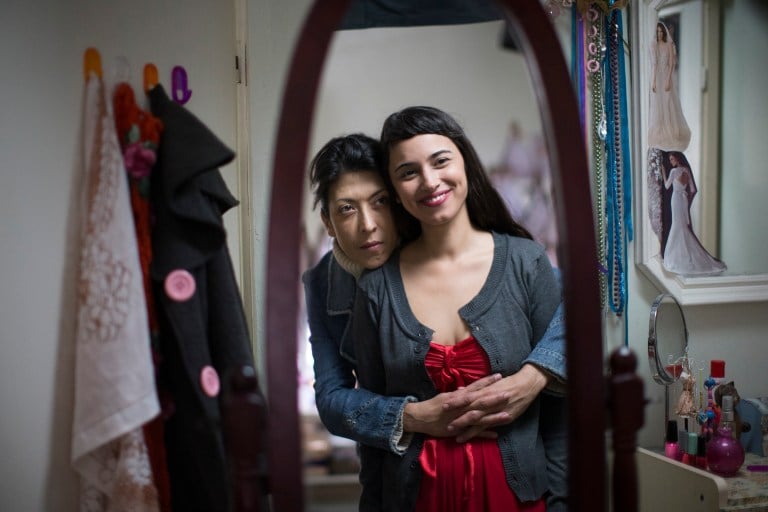With an intellectually disabled, purple-fuzzy-jacket-clad, red-lipstick-wearing protagonist, “Wedding Doll” presents a truly unique narrative. At first it seems that “Wedding Doll” will be a typical romance story, but as the story progresses it becomes something darker and more real. Actress Moran Rosenblatt portrays the protagonist, Hajit, and her mental disability in a believable and authentic way. She lends the film an unpredictable edge. Interestingly, the most heartfelt moments aren’t with Hajit and her love interest, but with Hajit and her dedicated mother, Sarah.
The story centers around Hajit, a 24-year-old aspiring wedding gown designer, and her divorced mother. Hajit works at a local toilet paper factory where she falls in love with Omri, the factory owner’s son. Hajit’s rose-tinted world is consumed by romance and weddings. She makes miniature wedding dresses with the extra toilet paper at work, and her room is decked out in wedding magazines and dolls. “Wedding Doll” goes on to the explore the blooming but complicated relationship between Omri and Hajit and the mother-daughter relationship between Hajit and Sarah. Hajit’s desire for independence often puts her at odds with her protective mother.
The looming desert setting gives the movie a cold and isolated tone. The film takes full advantage of the Negev desert by filming key scenes near the cliffs of the desert and including stunning shots of the Negev. Many of the characters turn to the vastness of the desert for solace and contemplation, so in the end the desert becomes a place of peace. The Negev offers a stark and haunting contrast to Hajit’s sunny disposition.
The best part of the film is Hajit. At first I thought I wouldn’t connect with Hajit because of her intellectual disability. But, I ended up really enjoying her character, wanting her to succeed at every chance she got. I wanted her to get the job at the gown shop. I wanted her to become independent and prove her mother wrong. I didn’t want her optimism to be tainted by the cruel world around her. She could have been easily portrayed as a simple individual who only served to make the audience feel pity. Instead, Hajit is portrayed as a stubborn, unrelenting, rebellious and optimistic woman. This movie could have easily been your typical romance where the girl marries her prince. However, though Omri is the toilet paper prince she’ll eventually marry, Hajit isn’t Omri’s ideal princess. Omri struggles with his relationship with Hajit. While he clearly admires her, he is aware of the ambiguous ethics and societal stigma that come with dating someone with an intellectual disability.
The most memorable moment is when Hajit applies in person for a job in the neighboring city. She applies to be a seamstress, but brings along her childish wedding designs to show the shop owner. Clearly unimpressed, the shop owner sends Hajit away, promising to call her later about the offer. She never bothers to call until Sarah goes back to the store and confronts her, because Hajit has been hopefully awaiting the call all week. The scene highlights the mistreatment that people with intellectual disabilities face. Hajit encounters this sort of treatment from almost everybody in her provincial hometown with the exception of her mother.
Even though the ending and romance fall flat, I recommend “Wedding Doll” for its unique protagonist and for the complex mother-daughter relationship. The film treats both Sarah and Hajit in a very human way. They both mess up, but they find their way out together.
Contact Citlalli Contreras at 17ccontreras ‘at’ castilleja.org.
